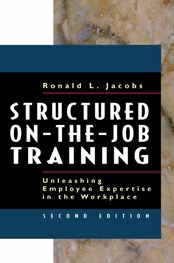Structured On-the-Job Training 2nd Edition
Unleashing Employee Expertise in the Workplace
Ronald Jacobs (Author)
Publication date: 03/12/2003
Bestseller over 20,000+ copies sold
Based on 20 years of research and development in a range of organizations
This revised and expanded edition of a classic text provides a comprehensive guide to understanding, developing, and using structured on-the-job training in a variety of training situations and organizational contexts. Jacobs defines S-OJT and provides a rationale based on the need to develop high levels of employee competence, or expertise, in the workplace. He then describes a six-step process used to design and implement S-OJT programs. The emphasis here is how S-OJT can be used for managerial training, technical training, and awareness training. The chapters in the final section describe how S-OJT has been used to achieve organizational and societal goals. Included in this section are discussions regarding S-OJT as an organizational change strategy, quality management, cross-cultural aspects, and workforce development.
This revised and expanded edition of a classic text provides a comprehensive guide to understanding, developing, and using structured on-the-job training in a variety of training situations and organizational contexts. Jacobs defines S-OJT and provides a rationale based on the need to develop high levels of employee competence, or expertise, in the workplace. He then describes a six-step process used to design and implement S-OJT programs. The emphasis here is how S-OJT can be used for managerial training, technical training, and awareness training. The chapters in the final section describe how S-OJT has been used to achieve organizational and societal goals. Included in this section are discussions regarding S-OJT as an organizational change strategy, quality management, cross-cultural aspects, and workforce development.
Formats
Paperback - $39.95 - Members: $35.96
Paperback - $39.95 - Members: $35.96
PDF eBook - $39.95 - Members: $27.97
Find out more about our Bulk Buyer Program
- 10-49: 20% discount
- 50-99: 35% discount
- 100-999: 38% discount
- 1000-1999: 40% discount
- 2000+ Contact ( bookorders@bkpub.com )
Orders of 10+ copies shipping to one address receive free ground shipping
within the U.S. Shipping to separate individual addresses via USPS media mail will be applied a handling fee:
Book Details
Overview
Based on 20 years of research and development in a range of organizations
This revised and expanded edition of a classic text provides a comprehensive guide to understanding, developing, and using structured on-the-job training in a variety of training situations and organizational contexts. Jacobs defines S-OJT and provides a rationale based on the need to develop high levels of employee competence, or expertise, in the workplace. He then describes a six-step process used to design and implement S-OJT programs. The emphasis here is how S-OJT can be used for managerial training, technical training, and awareness training. The chapters in the final section describe how S-OJT has been used to achieve organizational and societal goals. Included in this section are discussions regarding S-OJT as an organizational change strategy, quality management, cross-cultural aspects, and workforce development.
This revised and expanded edition of a classic text provides a comprehensive guide to understanding, developing, and using structured on-the-job training in a variety of training situations and organizational contexts. Jacobs defines S-OJT and provides a rationale based on the need to develop high levels of employee competence, or expertise, in the workplace. He then describes a six-step process used to design and implement S-OJT programs. The emphasis here is how S-OJT can be used for managerial training, technical training, and awareness training. The chapters in the final section describe how S-OJT has been used to achieve organizational and societal goals. Included in this section are discussions regarding S-OJT as an organizational change strategy, quality management, cross-cultural aspects, and workforce development.
About the Author
Table of Contents









